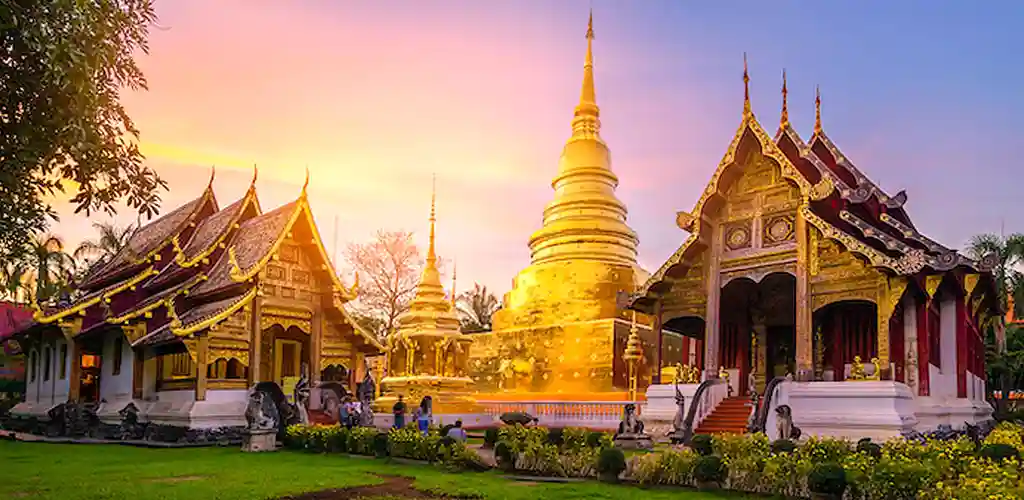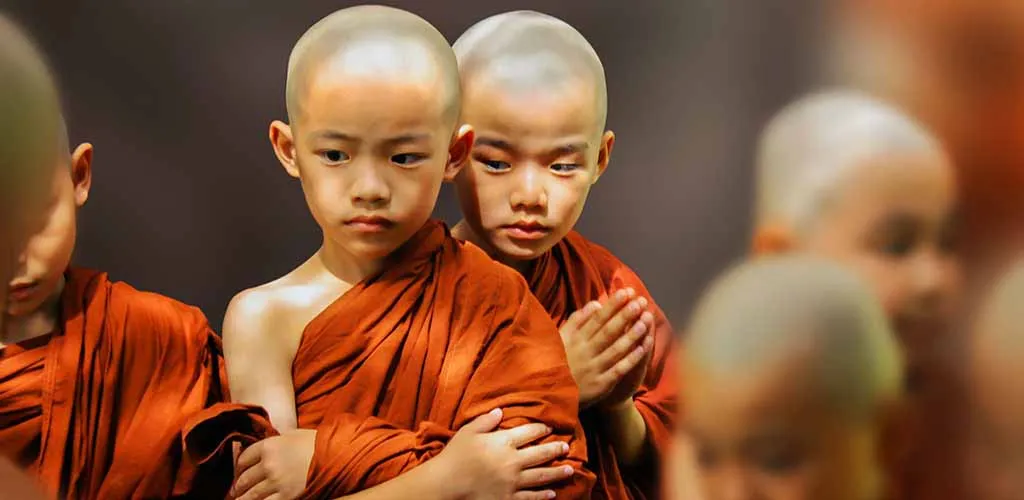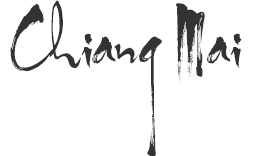Experience the warm welcome of the Lanna people of Chiang Mai, a melting pot of people and cultures from waves of immigrants from China, Vietnam and Myanmar. Thailand's second largest city surrounded by mountains and verdant landscapes is world's away from Bangkok, with an atmosphere dictated by an old-world spirituality and tranquility. Here is the place to learn authentic Thai cooking, buy unique handicrafts, trek with elephants to hill-tribe villages, explore numerous gilded temples, roam night markets, mountain bike river valleys, and laze in world-class boutique properties. Chiang Mai is a great people-watching city, from the popular weekend and night markets to street side cafes, then an hour or two of lovers' meeting surreptitiously near the gilded hilltop temple, Doi Suthep. We'd recommend giving the city time, because it's a great place to relax and settle into the local rhythm.
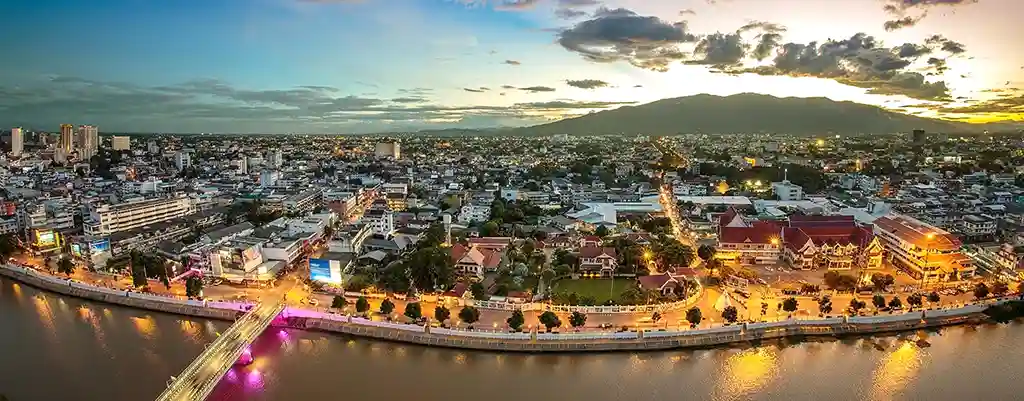
Home to prestigious Chiang Mai University and robust arts scene, Chiang Mai has a surprisingly cosmopolitan feel to it with a lively entertainment scene and some of the best eating in Thailand. Most travelers to Chiang Mai are younger backpackers and digital nomads, drawn to Chiang Mai not for the temples nor the food, but rather laid-back environment, and a first stop en route to the Golden Triangle. More seasoned travelers come for the elephant camps, cooking schools, golfing, or simply relaxing at resorts.
Highlights include Wat Doi Suthep, one of the country's most sacred sites, well-preserved old city, handmade crafts, delicious lanna cuisine, and sprawling night market where souvenirs abound. If you've come this far, we recommend the scenic half-day drive north to rural Chiang Rai in the heart of the Golden Triangle.
Chiang Mai Favorites
- Lanna cuisine. Delicious street food and fine dining, as well as delightful cooking classes
- Elephant sanctuaries—amazing encounters with the gentle animals
- Arts & artisans. Chiang Mai is known as a destination for the country's top artists
- Wat Doi Suthep at sunrise. Breathtaking views over the city and mountain ranges
- Chiang Dao National Park Hiking or Mountain Biking through the lush jungle mountains of this picturesque area
- Night Bazaar and Weekend Market—delicious food stall dishes and renowned handmade crafts
Chiang Mai in History
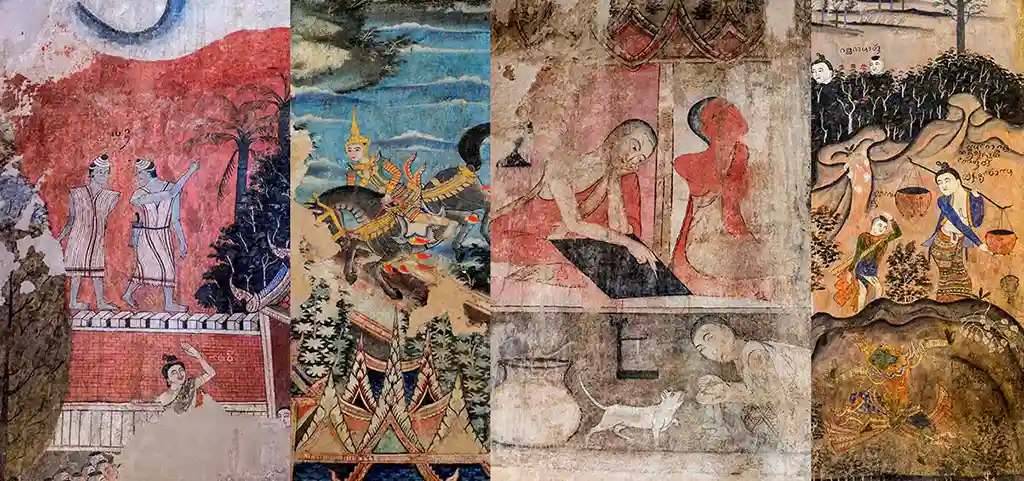
Chiang Mai's rich history stretches back over 700 years. Founded in 1296 by King Mengrai, it served as the capital of the Lanna Kingdom, a premier regional power in Southeast Asia. Under Lanna rule, Chiang Mai flourished as a multi-ethnic center of culture, religion, and commerce, evident in its plethora of magnificent temples, including Wat Chedi Luang and Wat Phra Singh. Over the centuries, the city faced a variety of challenges, including Burmese invasions in the 16th century and subsequent periods of Siamese (Thai) control. Invasion, trade and immigration lead to a rich mix of Chinese traders, Shan state immigrants from then Burma, and Westerners, including Christian missionaries. With the establishment of modern Thailand, Chiang Mai evolved into a significant urban center, blending its historical heritage with contemporary developments. Today, it remains a cultural hub renowned for its unique festivals, handicrafts, artist community, and the preservation of Lanna traditions amidst rapid modernization and development.
Elephant Camps in Chiang Mai
A highlight of Chiang Mai is the long established elephant camps, care centers, and sanctuaries. Programs offered are half- to full-day, with activities at the elephant centers around learning about the lives and care of the elephants, jungle treks with the animals, and washing or feeding. Lunch is typically included. We can arrange to visit farms in the area after your visit.
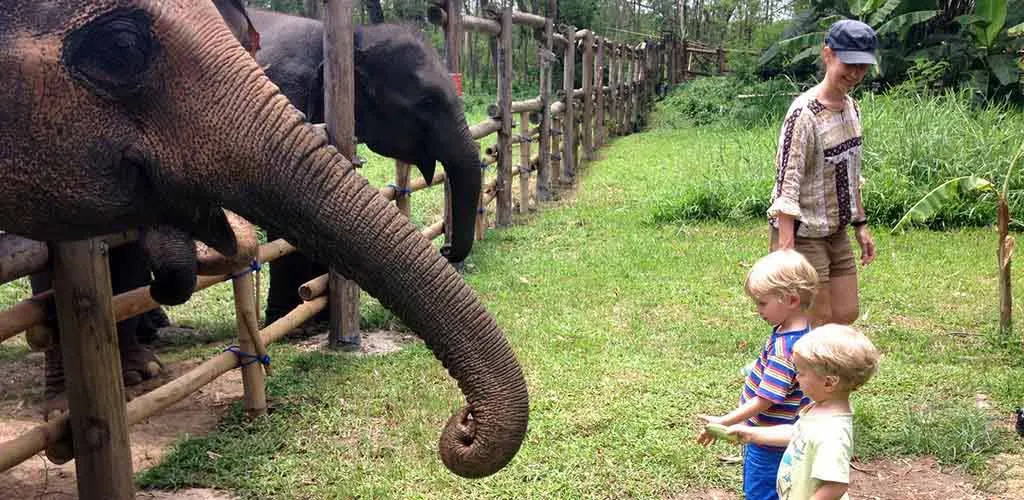
![]() Read more about Thailand's Asian elephant conservation and ethical camps
Read more about Thailand's Asian elephant conservation and ethical camps
Chiang Mai Cuisine & Dining
Thailand's second largest city is the best place to sample "Lanna" or northern cuisine, known for mild, not spicy, flavorful dishes featuring natural herbs and spices. The area’s farms provide and abindance of herbs, including galangal, lemongrass, and kaffir lime, used liberally to imbibe northern dishes with their tell tale fragrance. Featuring some of the healthiest dining in the region, vegetables dishes are prominent or compliment almost every dish.
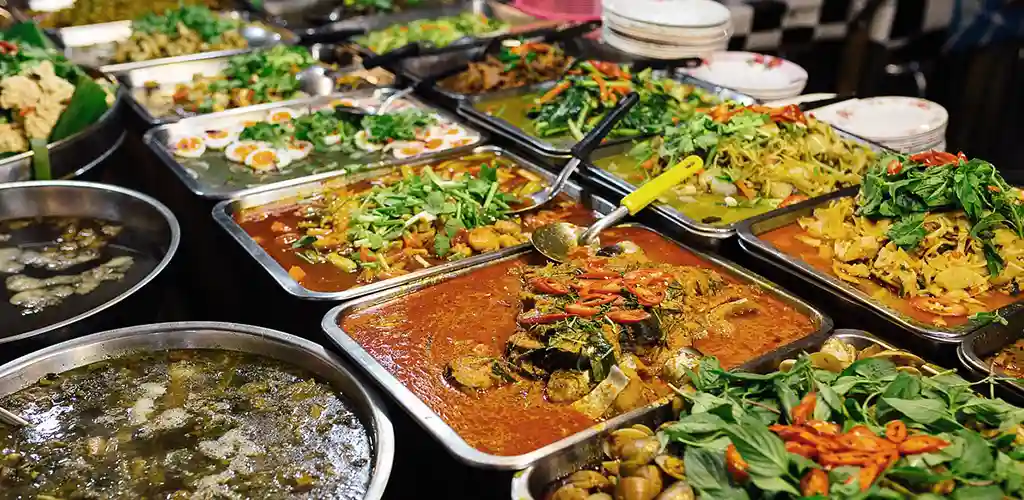
Chiang Mai also has its own style of street food, the most well known of which is khao soi, a dish made with flat egg noodles, resembling linguine, served in a either a chicken or beef soup. A thick black chili paste, lime, shallots and bean sprouts and other vegetables are served with the dish, which allow you to season to your own taste. While you can find this dish in some Bangkok restaurants, most people agree that there's nothing like the "real thing" found just about anywhere in Chiang Mai, including stalls at the Anusarn night market or small alleyways around town.
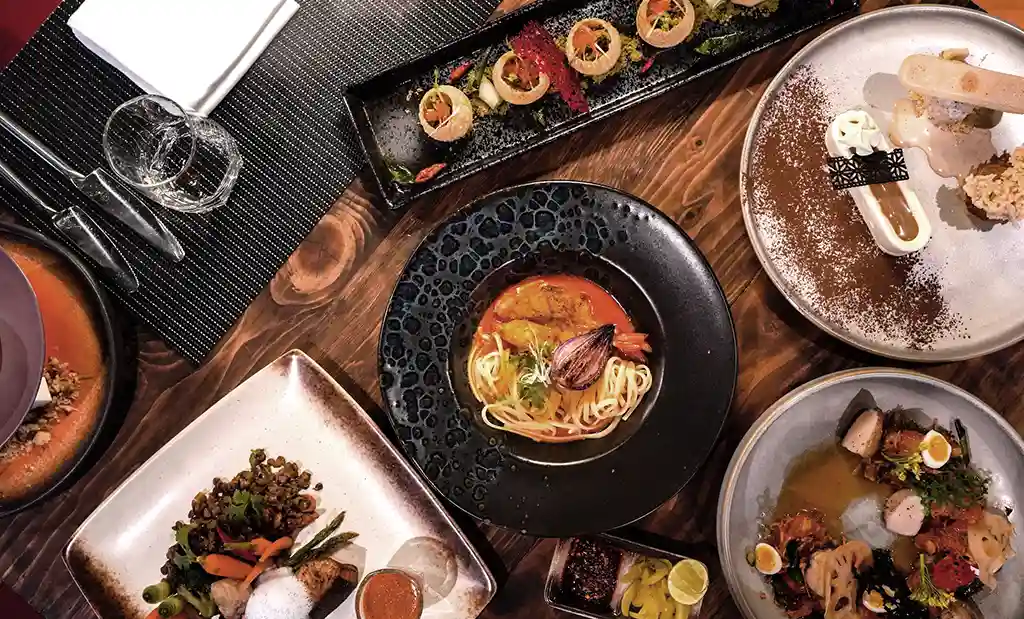
Several renowned cooking schools are located here, including the Sunday, outdoors class at the Four Seasons. Contact us for more information on group and private lessons, typically including markets exploration.
There are more than a dozen exceptional restaurants located in Chiang Mai, from the glamorous Farang Ses at the Mandarin Oriental, to the petite and romantic Bann Tazala, which sits only 16 diners. View a recent list of top places in Chaing Mai below, and also ask us for recommendations for the perfect dining experience in the Lanna Kingdom.
Top Restaurants in Chiang Mai
David’s Kitchen: A longtime favorite serving finer European cuisine in an elegant setting. The menu features dishes such as Japanese pumpkin velouté and grilled duck with a Thai twist. The extensive wine selection complements the refined dishes.
Blackitch: A 12-seater gem led by Chef Phanuphon “Black” Bulsuwan. Known for blending local ingredients with global influences, the nine-course tasting menu offers unique dishes like grilled elephant ear and Nordic-inspired creations. Chef Black's experimental ingredients, displayed in the restaurant, provide a memorable culinary journey.
Oxygen: Nestled within X2 Chiang Mai Riverside Resort, Oxygen offers a sophisticated Michelin-guide dining experience with panoramic, tranquil views of the Ping River. Chef Alexandre Demard's French background shines through Thai street food-inspired dishes, including a delicious chicken khao soi.
The Redbox: A testament to authentic Thai flavors, The Redbox emphasizes local ingredients, offering dishes like scallop carpaccio and lamb shack with a unique blend of regional influences.
Charoen Suan Eak: Offering authentic Northern Thai cuisine, Charoen Suan Eak provides a local experience with dishes like water buffalo salad and exotic dishes such as grilled bee larvae and green chili relish with wasp.
Heun Jai Yong: Located outside the city, Heun Jai Yong serves Northern Thai specialties in a traditional setting. Highlights include pork belly curry and stir-fried vermicelli, offering a great introduction to the region's cuisine.
Magnolia Café: Led by Chef Busarin “Noy” Larpadisorn, Magnolia Café offers Northern Thai classics with a personal touch. Dishes like mango salad and grilled pork showcase Chef Noy's expertise and dedication to authentic flavors.
Krua Mahabhirom: Set within the Villa Mahabhirom boutique hotel, Krua Mahabhirom offers home-style Central Thai dishes by Chef Somkamol “Pa Noi” Khamna. Despite simple presentation, the dishes excel in taste, making it a must-visit outside the city center.
Bombay Hut: Infusing Indian flavors in Chiang Mai, Bombay Hut offers a diverse menu curated by Chef Kroongtana “Chang” Nimnu, featuring tandoori dishes alongside Western and Pan-Asian creations, all set within a visually captivating ambiance.
Chiang Mai Markets & Shopping
Chiang Mai remains the long time center of Thailand's handicraft production, with several primary, secondary markets and shopping streets spread around the town (car required). The city is renowned for bamboo and teak furniture, ceramics, silver jewelry, silks, lacquer and antiques from around the region, including Myanmar although fakes abound. Nimanhaemin Road is known for jewelry and home wares, Hang Dong and Charoenrat Road stores are popular for antiques and art, while Sankampaeng and Thaepae Road shops feature ceramics and jewelry to a lesser extent. There are several noteworthy shops in each of these areas, such as Ceramthai which produces custom, one-off ceramics by appointment only. We can suggest quality shops selling specific items you are looking for or organize your itinerary around shopping areas that specialize in these items.
Art Encounter Chiang Mai
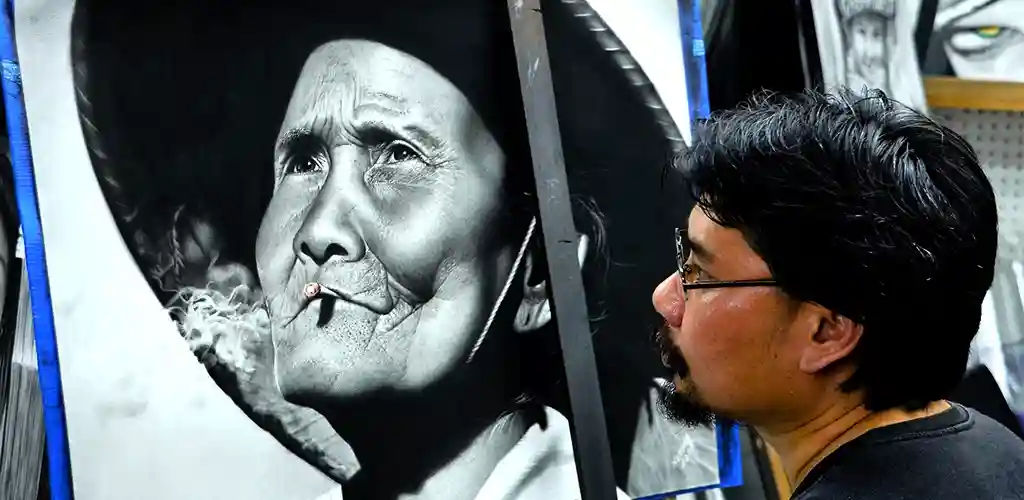
Chiang Mai and Chiang Rai, further north, have seen many top artists from the south and Bangkok arrive to set up studios, art spaces and galleries. The Chiang Mai City Arts and Cultural center caters to tourists who want to know more about the city's history and is a fully modern building. There are sections of the museum dedicated to educating visitors about the various hill tribes and the region's agricultural history. We can also arrange private studio visits with artist working in a variety of mediums and styles.

Chiang Mai & Sukothai Architour
A pleasant two-day itinerary focusing on Chiang Mai's exceptional collection of Buddhist temples and monuments, and an overnight trip south to visit the first capital of Thailand, Sukhothai, featuring atmospheric temple ruins.
Day 1 | Chiang Mai to Lampang
Following breakfast, departing Chiang Mai along a scenic mountain valley to the Lampang area, visiting Wat Phra That Lampang Luang, one of the finest and best preserved examples of Lanna style temple architecture in Thailand and one of the country's most revered. The complex contains a large number of buildings in a very original state, including the oldest surviving wooden viharn in Thailand the Buddha is said to have visited the site.
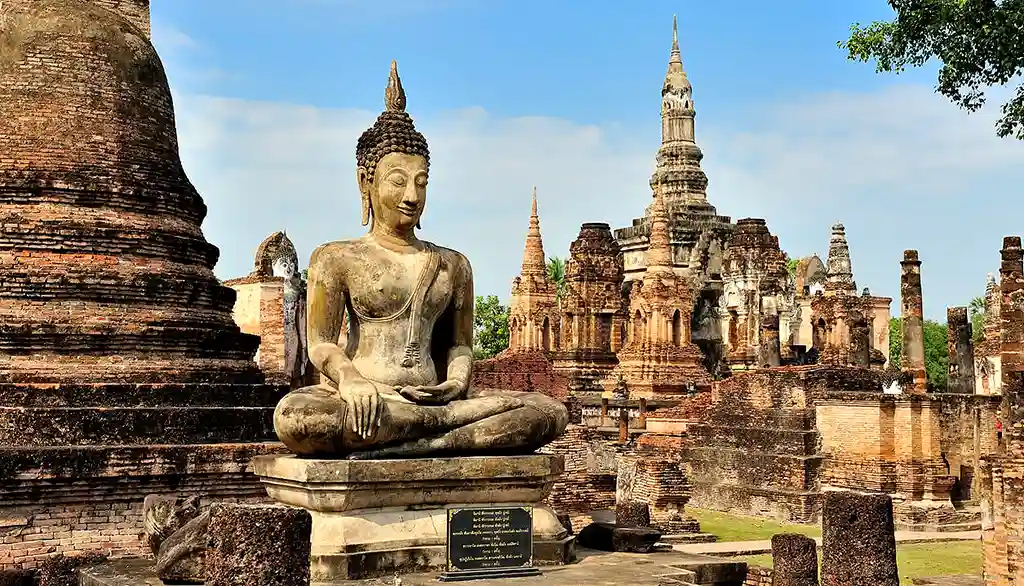
After Wat Phra That Lampang Luang, we drive on a short distance to the town of Lampang. In Lampang, enjoying a pleasant horse carriage sightseeing ride around the town and to visit Wat Phra Kaew Ton Tao, an important temple that once housed the sacred Emerald Buddha. After lampang, continue to Sukhothai, driving around two and half hours to reach the new town for dinner and accommodation.
![]() Regendha
Regendha
A comfortable boutique hotel inspired by the beauty of Sukhothai’s traditional village, The Regendha Sukhothai resort is designed and landscaped in a Thai village concept to deliver a sense of Sukhothai’s authentic ambiance. The Chedi Wat Chang Lom, an ancient temple in Sukhothai age, lies directly at the back of the boutique resort. All rooms feature teakwood furniture and generous in-room amenities are meant to serve you to utmost comfort.
Day 2 | Sukhothai
Immediately apparent to any visitor is that Sukhothai is one of Asia’s most under-rated World Heritage sites. Although not on the scale as Angkor, the historical park filled with striking ruins of royal palaces, Buddhist temples and monuments. Sukothai means "rising of happiness" and indeed the best time to visit is by the rising sun. We'll arrive by the morning light, when most beautiful and ahead of the tour buses to explore the main attractions, including Wat Traphang Ngoen, the largest and principal temple of the Sukhothai Kingdom, the massive pagoda, Wat Mahathat, Wat Sa Si and its lovely chedi and giant seated Buddha, sublime shimmering lotus pool at Wat Mahathat, the largest and arguably most impressive single site in Sukhothai, and Sukhothai’s single most awe-inspiring monument, Wat Si Chum,
The Ramkamhaeng National Museum located at the entrance will provide a comprehensive overview and significance of the Sukhothai kingdom, where we can pause before or after exploring the park. Following exploration of the main monuments, taking an optional short hike in the park's western zone to Wat Saphan Hin, a hilltop temple that affords views of the central zone ruins and surrounding countryside. Before returning to Chiang Mai, enjoying lunch at a local cafe in the "new Sukothai" town. In the afternoon, exploring the design and arts section of Chiang Mai located near the university. This evening, dining by choice of restaurant (recommendations and reservations provided).
Chiang Mai Shopping & Markets
Chiang Mai's Night and Sunday Walking Market
The famous Sunday Walking Street is a must-see if you are here that day of the week. The market and more takes places from about 4 pm until midnight and should not be missed if you'll be in Chiang Mai. The Walking Street Market sprawls from Thapae Gate and along the length of closed-off Ratchadamnoen Road through the heart of the Old City. More than a market, it is a focal point for locals to meet, browse, socialize, haggle and enjoy themselves.
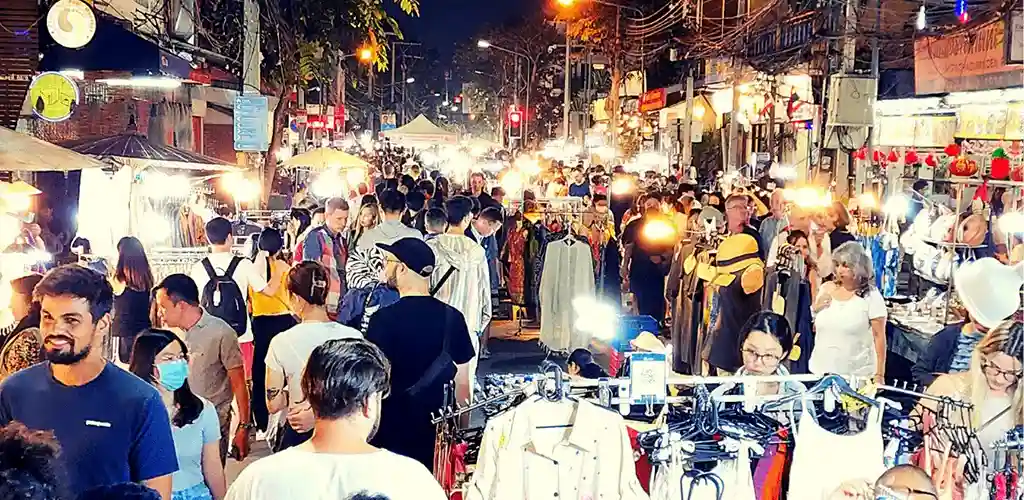
The market is a showcase for authentic art and craftsmanship of Northern Thailand. Many vendors have personally made the items they sell and the variety of hand-crafted objects are testimony to the design and craft skills of local people. The market is also a great venue to see genuine Thai street entertainment, with pavement artists, traditional musicians, dancers, living statues, puppet shows, and rock-n-roll bands which add to the festive nature of the environment. The market is also fantastic for sampling delicious street foods.
Chiang Mai Luxury Hotels
Four Seasons Chiang Mai
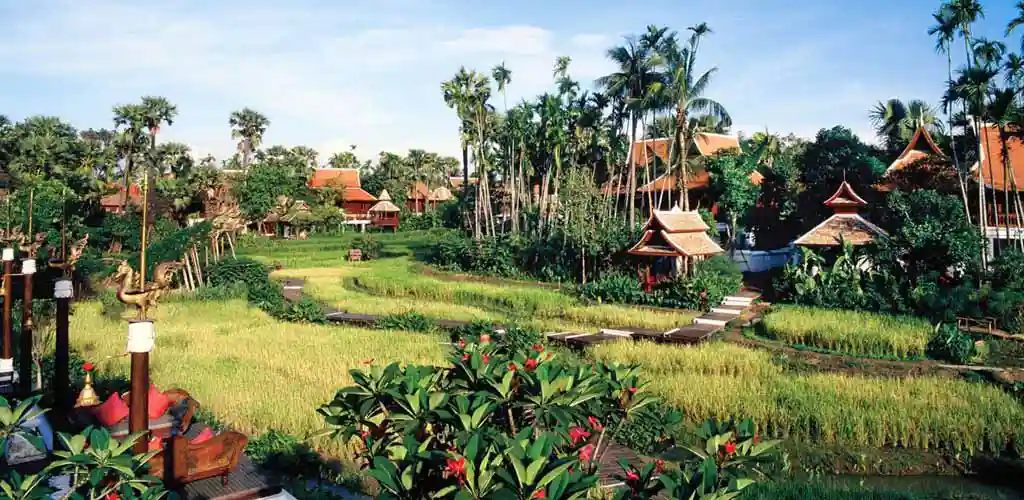
Renowned, world-class property on par with the now-closed Mandarin Oriental Dhara Dhevi, this enchanting resort oasis lies in a picturesque valley, 20 minutes north of Chiang Mai. Landscaped gardens, water lily ponds, and terraced rice paddies surround the 98 large and distinctive guest pavilions and villas. These feature spacious teak-floored bedrooms, separate dressing areas, oversize baths (garden soaking tubs and shower stalls), and inviting gazebos.
Thai and Continental restaurants are augmented by a casual café and charming Elephant Bar pavilion and excellent cooking school. Amenities include a 65-foot infinity lap pool, tennis, a fitness studio and sophisticated spa. Championship golf is available nearby. Upstairs pavilions offer rice paddy views. Childcare and kid's activities offered daily 9am to 5pm for children ages 4 to 12.
Our take: A spacious setting with abundance of nature throughout. Good for families, with children's activities and one of the best values for a luxury hotel in Southeast Asia. Still, consider one the many charming boutique properties closer to the action in town, which Chiang Mai excels in, or the Shangri-La for younger children (below).
Shangri-La Chiang Mai
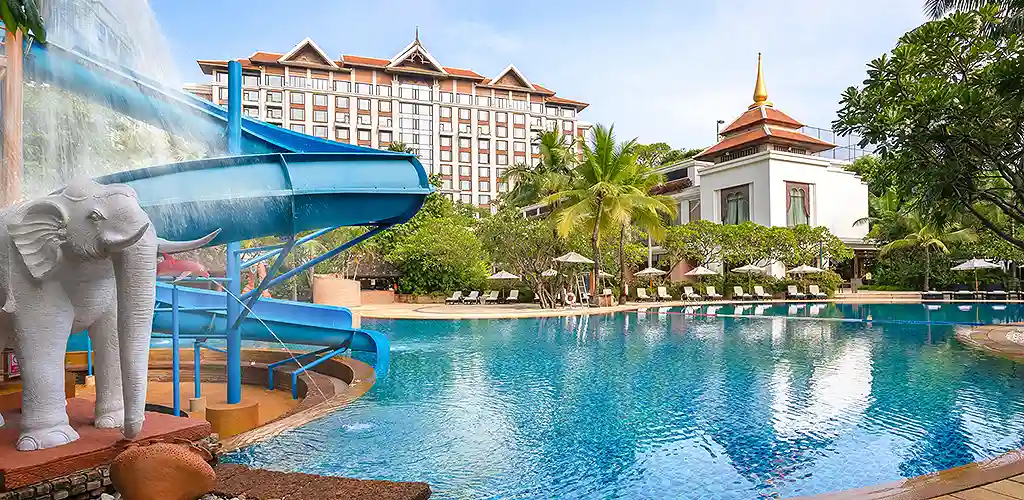
A top choice for families exploring the Lanna Kingdom. A sprawling traditional resort with extensive facilities, amenities, featuring large, comfortable rooms. Kids will enjoy the largest pool in Northern Thailand and kids’ club, a smaller younger children’s pool with water slide. The resort also offers activities for kids including cooking and feeding fish. Children under six stay free and get a free breakfast; those aged between six and 12 receive a 50 per cent discount. Extra beds (free for under-12s), and baby cots as well as babysitters are available, and the resort offers connecting rooms for older children.
Golfing Chiang Mai
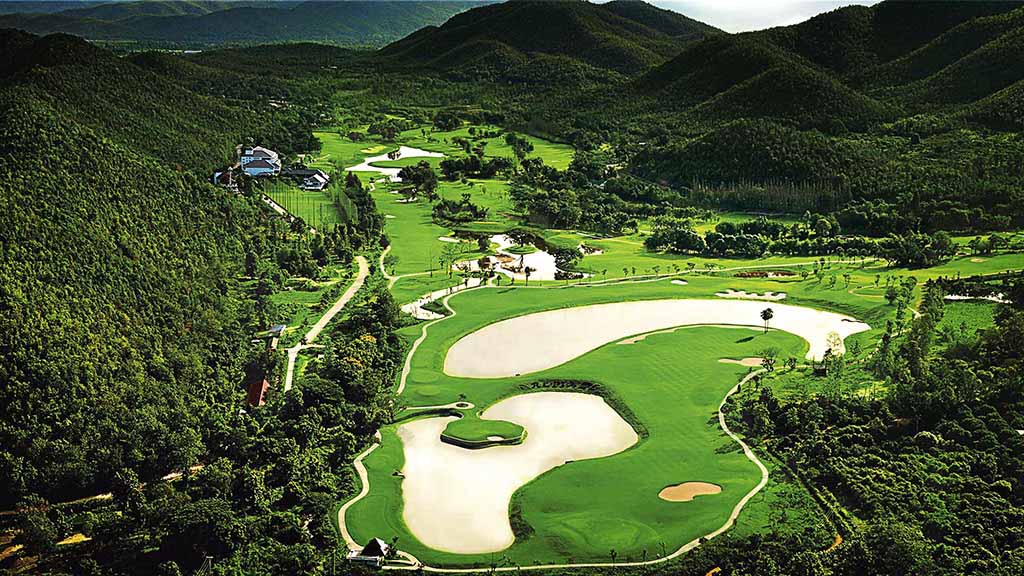
![]() Chiang Mai features a variety of world-class golf courses, including the Chiang Mai Highlands, Royal Chiang Mai Golf Club & Resort, North Hill Golf Club, a signature mint-condition golf course with the panoramic Doi Suthep mountain scenery, stunning valley location at Chiang Mai's finest and most picturesque course, The Alpine Golf Resort (above), and Gassan Khuntan (their "legacy" course is also worthwhile, having been renovated in 2013), located next to Khuntan National Park, that is one of the most beautiful and at the same time most challenging courses in all of Thailand.
Chiang Mai features a variety of world-class golf courses, including the Chiang Mai Highlands, Royal Chiang Mai Golf Club & Resort, North Hill Golf Club, a signature mint-condition golf course with the panoramic Doi Suthep mountain scenery, stunning valley location at Chiang Mai's finest and most picturesque course, The Alpine Golf Resort (above), and Gassan Khuntan (their "legacy" course is also worthwhile, having been renovated in 2013), located next to Khuntan National Park, that is one of the most beautiful and at the same time most challenging courses in all of Thailand.
Outdoor Adventures in Chiang Mai
Mountain Biking in Chiang Mai
This morning, driving due north for about 1.5 hours past small towns and villages into verdant mountain landscapes to bucolic Chiang Dao, a small town of about 15,000 people that lies above the Menam Ping gorge on the green slopes of Doi Chiang Dao mountain range. Chiang Dao mountain is "the last tooth of the Himalayas," rising majestically above others in the area. Chiang Dao is known for its caves and Buddhist sanctuary, and is adjacent to Pha Daeng National Park, which covers over one thousand square kilometers of the stunning craggy mountains. Being fairly high up, it's noticeably cooler and drier than on the plains (and can get downright cold in the winter). There are extensive bamboo forests and a number of mountain streams and waterfalls. In addition to the mountain views, there are many Lisu and Karen hill tribe villages scattered throughout the park.
Our ride will pass through the surrounding jungle and bamboo forests of Mae Taeng Valley, leading to small hill tribe villages where we will pause to visit with Lahu, Lisu, and Akha hilltribes. Continued riding after lunch through the valley until mid-afternoon. There is an opportunity to shower and freshen up in Chiang Dao before the return drive to Chiang Mai. After arrival in Chiang Mai, free at leisure at resort, enjoying the pool and spa.
![]() Today's mountain biking trip on dirt roads and trails through Mae Taeng Valley can be a as gentle or challenging as you desire. There are numerous places of interest to stop and sightsee aside from the biking, including the Buddhist sanctuary and hilltribe villages. Total cycling distance: from 10 to 22 miles (mostly flat and rolling terrain on paved and dirt trails).
Today's mountain biking trip on dirt roads and trails through Mae Taeng Valley can be a as gentle or challenging as you desire. There are numerous places of interest to stop and sightsee aside from the biking, including the Buddhist sanctuary and hilltribe villages. Total cycling distance: from 10 to 22 miles (mostly flat and rolling terrain on paved and dirt trails).
Note: please pack a change of clothes for post-ride in Chiang Dao where we will shower after cycling.
When to visit?
The best weather of the year in Chiang Mai is between November to April, dry and before the higher heat of summer and monsoons in late summer to early fall though it is important to avoid peak crop burning periods (contact us).
